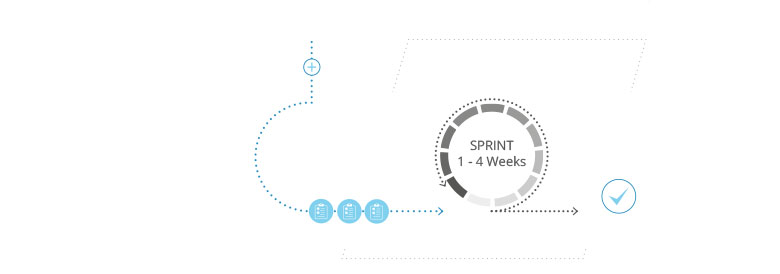SAP Activate method by ORBIS
SAP Activate is your key to effective digitalization
Alongside the expertise of those involved in the project, a structured methodology that matches the project topic is crucial to the successful implementation of SAP in a company. SAP Activate has minimal overheads (administrative effort) and is suitable both for complex projects and for smaller implementation projects or adjustments to existing solutions. It only requires a few tools, and besides, the SAP Activate method is also very easy to learn and understand. Project teams often even perceive the SAP Activate methodology as a simplification compared to the conventional approach, which boosts acceptance.
The implementation of SAP software ranks among the most complex and largest projects undertaken by companies. Regardless as to whether SAP cloud solutions, on-premise solutions, brownfield or greenfield approaches or rollouts are involved, SAP projects typically have a direct impact on critical business processes. Therefore, those involved in the project are not given any leeway in the project work. The teams must deliver coordinated results in all disciplines and achieve the project goal by working as one. This is especially the case for SAP S/4HANA and SAP ERP projects, where project teams from different departments and consulting firms often have to work collaboratively.
The SAP Activate method as the state of the art
The SAP Activate method, a successor to the Accelerated SAP method (ASAP for short), is considered to be the state of the art. Unlike ASAP, SAP Activate combines classic waterfall aspects with modern agile methodologies and principles. SAP Activate is suitable for both largescale and small on-premise products, such as SAP S/4HANA projects and SAP ERP solutions, as well as for implementing all other SAP products, including cloud solutions.
The SAP Activate Implementation method is not the first and not the only hybrid method, but it is definitely a very successful collection of helpful waterfall and agile tools.
Our ORBIS project methodology based on the SAP Activate method
ORBIS has optimized the SAP Activate method to its own particular needs. We have incorporated all our experience and the specific requirements of our customers and consultants to optimize the SAP Activate methodology. Nevertheless, we remain fully compatible, which is an asset especially when projects are jointly implemented by several consulting companies.
At the core of any SAP Activate project is a roadmap with defined quality gates that guides the project managers and the project team towards the goal. Quality gates are milestones set in the course of a development project at which a decision is made on whether to proceed to the next project step or not, based on predefined quality criteria. The SAP Activate method furthermore ensures that all of the company’s project teams work in a consistent manner. Everyone works to achieve a common goal with the same level of detail. The interdisciplinary coordination of work content is a basic principle that ensures meaningful interim results.
In addition to the methodology itself, even the use of SAP best practices as a starting point for the solution design also contributes to the final result. See for yourself and gain an exciting insight into the ORBIS project methodology by watching our team of experts at work in our video.
The 6 phases of the SAP roadmap in the ORBIS project methodology:
The SAP Activate methodology consists of six phases: Discover, Prepare, Explore, Realize, Deploy and Run. In addition to the aforementioned roadmap, ORBIS provides the necessary tools for managing and implementing the project work. Even though the SAP Solution Manager and SAP ALM also fully supports the SAP Activate method, but their use is not a must.

Phase 1: Discover
The focus in this phase is on scoping. This is where the project scope and project boundaries are defined. The Discover phase therefore involves finding answers to a number of questions, such as: What demands are placed on the solution? Which business processes are concerned? Which systems and modules can be taken into consideration? What is the scope of the project in terms of time and space and, above all, what are the expectations of the stakeholders and process owners?

Phase 2: Prepare
In the Prepare phase, the project teams are defined, the project standards are coordinated and the project is organized and prepared in terms of infrastructure.

Phase 3: Explore
The Explore phase involves the consultants gaining an understanding of the requirements and giving the customer the most tangible impression possible of the future solution. This is based on SAP best practice processes, ORBIS solutions and, above all, the expertise and knowledge of ORBIS experts.
A fit-gap analysis is carried out (known as a fit-to-standard analysis in the cloud context due to the narrower scope). Together with the customer’s representatives, an appropriate solution design is then developed. There is no highly theoretical business blueprint that is open to interpretation, but rather as many concrete and clear solution concepts as possible from the very outset. This automatically focuses on the key sticking points and not just on the “low hanging fruit”, as in the classic approach.

Phase 4: Realize
The Realize phase is typically the domain of the implementation consultants, who use Agile methodologies to detail, implement and document the solution designs right from the Explore phase. A proper definition of the sprints is a decisive success factor in this respect. A sprint must not be too long, but also not too short. Most importantly, the content must be defined in such a way that a self-contained partial result can be inspected in the sprint review. End user training and the final end-to-end integration tests are also part of this project phase, in which the application of agile project management is particularly evident due to its nature.

Background: What is a sprint?
In the agile working method, a sprint is a defined period of time in which the backlog content should be delivered. A review also takes place after each sprint. This is where the entire project team jointly reviews the past sprint and looks at which actions have been successfully completed to achieve the objectives and which are still outstanding. The objectives are then reprioritized if necessary.

Phase 5: Deploy
In the Deploy phase, the data is transferred and the productive implementation of SAP goes live. Needless to say that ORBIS consultants will also help your company immediately after the go-live phase, when the new solution is up and running.

Phase 6: Run
The run phase no longer belongs to the actual project or the roadmap. This involves supporting and further developing the solution during operation. In this respect, ORBIS also supports customers as part of its Managed Services package.
ORBIS is just the right SAP Activate partner for your company
ORBIS supports you using the SAP Activate methodology from the outset through to the end of the project and accompanies you along the entire project roadmap.
Discover our advantages and see for yourself:
1. The methodology is simple and reliable
- The ORBIS project methodology is closely based on the SAP Activate method
- Only a few central control documents need to be maintained, which means little overhead
- Content and formal templates are available for all project phases
- ORBIS experts support you along the entire roadmap
2. A concrete idea of the future solution is created at the earliest possible point in time
- Where possible, actual examples from the system are used instead of abstract slides
- The focus on best practices ensures a forward-looking solution that comes as close as possible to the SAP standard
3. Efficient creation of process documentation
- The best practices documentation supplied by SAP is used wherever possible
- Customer-specific processes and functions are documented in detail (WRICEF specifications)
- All standard and customer-specific documentation is merged into one solution documentation (SAP Solution Manager, SharePoint, network drive, etc.)
4. Agile realization of sprints
- Sprints guarantee coordinated, step-by-step implementation by all project teams involved
- They yield consistent intermediate results
- The customer is provided with regular control and correction points in the form of sprint reviews
You don't yet have an SAP implementation in your company and need support to make an effective contribution to digitalization? Our ORBIS experts will gladly assist you with the digital transformation of your IT landscape and the introduction of your SAP system. Find out more about our cloud topics on our SAP S/4HANA & ERP website.
3+1 reasons why we are right by your side, and not just in project management
Let us help you focus on your future and on the right solutions. SAP by ORBIS is the SAP consulting partner you need to achieve success.
Your added value with ORBIS consulting services:
We help you digitalize your business processes
We offer you end-to-end process consulting services for SAP solutions in numerous fields and sectors
We provide support for both your Management and IT and help you implement your strategy
Our portfolio comprises a number of SAP solutions and add-ons




